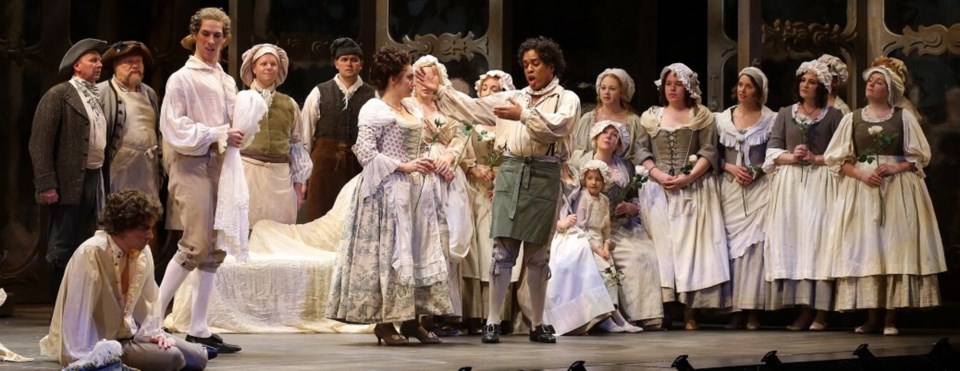Review
Pacific Opera Victoria: Mozart’s The Marriage of Figaro
When: April 26, and 30, and May 2, 8 p.m.; May 4, 2:30 p.m.; pre-performance lecture one hour before showtime.
Where: Royal Theatre
Tickets: $40 to $135; rmts.bc.ca, 250-386-6121 or 250-385-0222, POV and Royal Theatre box offices; student rush tickets $15 at the door one hour before each performance, subject to availability.
Mozart’s The Marriage of Figaro was the first work Pacific Opera Victoria ever produced, in 1976, when it was the Vancouver Island Opera Society. POV mounted Figaro again in 1990 and 2003, and its latest staging — a co-production with Calgary Opera — opened Thursday to a noisy ovation.
Figaro is notoriously long for a comedy and despite cuts POV’s production runs close to three hours (including an intermission). But it never drags. And Mozart’s gorgeous music is rendered so well that another hour’s worth of it would not be unwelcome.
As staged by Brent Krysa, the comedy is genuinely funny, never seeming coarse or contrived even when it is broad, while the moments when deeper sentiments emerge (the forgiveness scene at the end, for instance) are genuinely touching.
POV’s artistic director, Timothy Vernon, leads the Victoria Symphony in a meticulous and spirited performance. He luxuriates in Mozart’s lyricism while still maintaining a brisk overall pace; his reading is supple, full of colour and feeling, but also tight, articulate and nimble, a neat balancing act that seems to get at something essential in Mozart’s style.
Vernon’s control is particularly impressive in the finales of Acts 2 and 4, which are as long as many a Mozart symphony.
POV has assembled a very young cast; too young, in truth, for those characters requiring maturity and authority. But it scarcely matters, given the vocal assurance of all 10 principals, and because their youth pays dividends in the infectious energy, enthusiasm and eagerness they bring to their performances. The result (as Mozart intended) is characters who are not merely comical but also passionate; real flesh-and-blood people.
Soprano Miriam Khalil, an especially adroit and polished comedienne, is bright and spunky as Susanna, though the richness of her sound hints that there are hidden depths to this soubrette. Baritone Justin Welsh’s Figaro is a charming scamp, immensely likeable and vividly expressive, whether cavorting or scheming or cursing womankind. Soprano Leslie Ann Bradley gives a moving, rich-hued, beautifully nuanced reading of the Countess’s aria Dove sono, and baritone Phillip Addis is commanding across a wide range of emotions in the Count’s one big aria (these numbers won the most applause on Thursday).
As in POV’s 2003 Figaro, the page Cherubino — a trouser role for a mezzo-soprano — is played by a man, countertenor Ray Chenez.
This decision pays off handsomely because Chenez easily passes for a teenager. Performed by a man, everything about Cherubino registers more effectively; his cross-dressing is funnier, for instance, and he can really kiss Barbarina without making the audience squirm. (He can take off his shirt, too. When was the last time you saw a mezzo do that?) What Chenez does in a mezzo’s register is technically amazing and often affecting, and his Cherubino is at once hilarious and sympathetic (Thursday’s audience plainly adored him).
Mezzo-soprano Erin Lawson, as Marcellina, with her Marge Simpson hair, creates a little masterpiece of comic self-importance and dudgeon. So does bass-baritone Thomas Goerz, as Bartolo, whose Act 1 aria is an early highlight. Even the smaller roles register very strongly here: soprano Erica Warder as Barbarina, tenor Michael Barrett as both a toadying Basilio and a stuttering Curzio, baritone Andrew Erasmus as the gardener Antonio.
Designer Cameron Porteous has created a lovely, sumptuous 18th-century set that includes two pairs of huge revolving doors.
Robert Thomson’s lighting enhances the glamour of Porteous’s set, while underscoring the shifting emotional temperature of the story.
